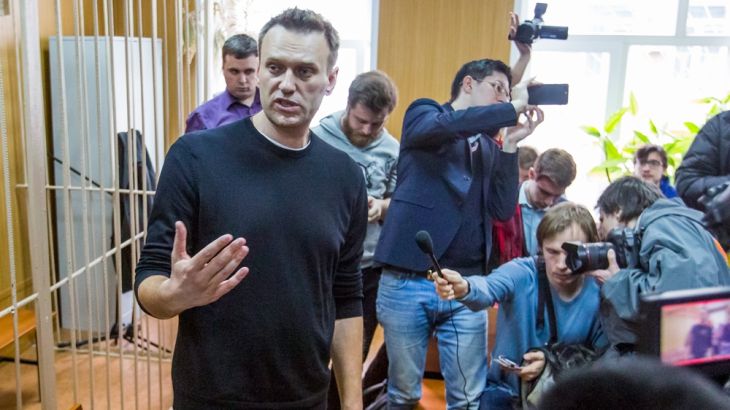Opposition leader Alexei Navalny jailed for 15 days
EU calls for release of prominent Kremlin critic Navalny, a day after he was arrested at opposition protest in Moscow.

Russian opposition leader Alexei Navalny has been sentenced to 15 days in prison after being arrested at a major opposition protest that he had organised.
A Moscow court issued the verdict on Monday against Navalny for resisting police orders on Sunday when he walked to the protest in the Russian capital.
Navalny, 40, posted a selfie on Twitter from the courtroom, saying: “A time will come when we’ll put them on trial too – and that time it will be fair.”
“Even the slightest illusion of fair justice is absent here,” Navalny said on Monday at the defendant’s bench, complaining about the judge striking down one motion after another.
“Yesterday’s events have shown that quite a large number of voters in Russia support the programme of a candidate who stands for fighting corruption. These people demand political representation – and I strive to be their political representative.”
Tens of thousands of protesters took to the streets across Russia on Sunday in the biggest show of defiance since the 2011-2012 anti-government protests.
PROFILE: Alexei Navalny, thorn in Putin’s side
The Kremlin has dismissed the opposition as a westernised urban elite disconnected from the issues faced by the poor in Russia’s far-flung regions. But Sunday’s protests included demonstrations in the areas which typically produce a high vote for President Vladimir Putin, from Siberia’s Chita to Dagestan’s Makhachkala.
Putin’s spokesman on Monday criticised the organisers for allegedly inciting illegal acts.
|
|
“The Kremlin respects people’s civic stance and their right to voice their position,” said Putin spokesman Dmitry Peskov.
“We can’t express the same respect to those who consciously misled people and who consciously did it yesterday and provoked illegal actions.”
Peskov defended the Russian police in riot gear who were seen manhandling protesters, some of whom were minors, calling their response “highly professional and lawful”.
Asked about the Kremlin’s reaction to the wide geography of the protests, something that has not been seen at least since 2012, Peskov said “the Kremlin is quite sober about the scale of yesterday’s protests, and are not inclined to diminish them or push them out of proportion”.
Putin “constantly talks to people” and is well-briefed on the sentiment in the country, Peskov insisted.
Peskov also claimed that underage protesters in Moscow were promised cash if they were arrested.
The Council of Europe said the detentions of the protesters raised concerns about freedom of expression and assembly.
Russian authorities should release all those detained, Secretary-General Thorbjorn Jagland said.
The European Union and the United States also condemned the detentions.
German government spokesman Steffen Seibert said freedom of assembly, which is “of great importance to democracy,” was being tested in Russia.
OPINION: Under surveillance in Russia
The resignation of Prime Minister Dmitry Medvedev was the main demand of Sunday’s protests that were called for by Navalny after he published a detailed report this month accusing Medvedev of controlling a property empire through a shadowy network of non-profit organisations.
Medvedev, who has so far made no comments on the claims, is accused of amassing a private collection of mansions, yachts and vineyards. The alleged luxuries include a house for raising ducks, thus many placards in the protests showed mocking images of a yellow toy duck.
Al Jazeera’s Rory Challands, reporting from Russia, said that the breadth and scale of Sunday’s protests had likely surprised both Navalny and the Kremlin; solidifying Navalny’s position as the pre-eminent opposition voice.
“Navalny’s message of anti-corruption has really struck a chord with Russians,” said Challands. “And going after Dmitry Medvedev, the prime minister, is pretty canny because – although Putin at the top of the tree is fairly unassailable – Dmitry Medvedev is a different political animal. He is much more vulnerable, much less popular, and putting pressure on him puts pressure on Vladimir Putin.”
|
|